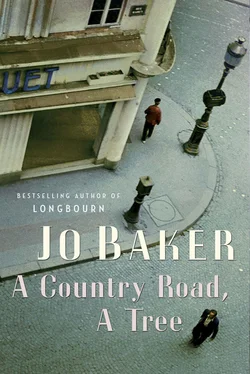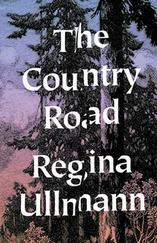“You must be new,” she says. She speaks in French, formally, but the accent carries Irish threads. “We haven’t met. Beamish. Anna.”
“Enchanted.” He squats to fuss her dogs.
“You are lodging at the Hôtel de la Poste, I imagine?”
He nods.
She leans closer to stage-whisper, still in French, “Between you and me, that place is a dump.”
The dog rolls on its back. He scratches at its bristly chest. He hides a smile.
“That daft creature would take any amount of that,” she says.
He looks up at the soft underside of the woman’s chin as she peers down at him. He says in English, “We had Kerry Blues. At least, my mother did.”
There is a strange comfort in speaking those actual words in that actual language. The way they are pinned to that particular moment and that particular place: the damp muzzle, the slate-grey pelt under his hand, the sweet old fool of a dog. And his words make the woman’s face break into a delighted grin.
“An Irishman!” she says. “My word!”
He wobbles upright, offers his hand; she shakes it, brisk and vigorous.
“Well, fancy that.” A moment’s delighted silence, contemplating him, clasping his hand.
“We’ve just arrived,” he says. “We’re still finding our feet.”
“Oh, we can help you find them, me and my pal. You’ll soon forget your feet were ever missing.” She lets his hand go. “You’ll take a drink,” she says. “Come on.”
—
“What do you do here?” he asks. “I mean, how does one get by?”
“I have my royalties. That keeps us ticking over.”
“Oh. You’re a writer?”
She is reaching for the wine. “Am indeed.”
“I don’t think I know your work.”
She wafts away any notion that he might. “I write racy novels. Educated fellow such as yourself.” She shrugs. “And anyway, I have a pen name, people think I’m a chap.”
“But they must sell, if you can live on your royalties.”
“They do indeed.”
He raises his glass to her. “Félicitations.”
“You’re a writer yourself, then?”
Out across the square, the fig tree droops above the stone bench, the fruit already stripped, the leaves heavy and suggestive. He feels suddenly guilty, exposed.
“What makes you say that?”
She smiles. “There’s a tell. Your face…” She wafts her hand. “It did a thing when I mentioned royalties. So I deduce from that, and from the way you speak, that you must be a writer.”
“Writing has occurred,” he concedes.
“Ha!” She leans away, studies him a moment, then reaches over to refill his glass. “Tell me all your troubles.”
“Ah. Well. You know how it is.”
Inwardly, he is walking through the cemetery at Père Lachaise, packed tight with massive monuments to the brilliant dead. Not a patch of grass on which to pitch his own rotten little tent. No certainty now that he even wants to, not any more.
“No, I don’t. How is it?” Miss Beamish asks.
He sits back. “James Joyce was a friend of mine.”
“Oh no.”
“I used to help him with his work. With whatever he needed, really. I was a secretary to him.”
She shakes her head. Tuts.
“Finnegans Wake,” he says. “I helped him with that, and I worked on the French translation.”
“Oh you poor thing.” Her face is a parody of sympathy. She shakes her head. “Being friends with a genius.”
She waves the waiter over, holds up the empty pichet for a refill. Then she turns back to him, reverting to English.
“But what was this writing that did occur, despite your difficulties?”
He raises a shoulder. “It never came to very much.”
“Get away of that with you.”
He catches her smile. He knows he will be half-cut and stinking of booze by the time he gets back to Suzanne, and that Suzanne will be cross and say that she isn’t cross, and that this state will go on for days, but it is a long time since he has felt so entirely at his ease, a very long time indeed, and it is worth the price that must be paid for its continuance.
“And now,” he says, “I just can’t see the point of it at all.”
“Because of the war?” She tilts her head, considering, as she refills their glasses. “There’s still the oldest and best reason. Even in war, even in any circumstances, really. That still applies.”
“What’s that then?”
“Spite,” she says.
He snorts.
“No, I’m serious,” she says, not very seriously. “You need a bit of spite, a bit of venom, to keep you going. Particularly at the start, when no one gives a damn what you’re up to.”
“Well, yes, I suppose so.”
“And then, of course, it’s necessary.”
“Necessary?”
“If one is not writing, one is not quite oneself, don’t you find?”
And he thinks: the sweaty sleepless nights in Ireland, heart racing, battling for breath. Frank’s gentle company the only thing that could calm him. The two things are connected: the writing and the panic. He just had not put them together, until now.
“It’s like snails make slime,” she’s saying. “One will never get along, much less be comfortable, if one doesn’t write.”
He huffs a laugh.
“So.” She shrugs. “There you are. You’re stuck with it.”
He raises his glass. She chinks it.
“To spite,” she says.
“And slime.”
They drink.
—
There are voices beyond the wall; there are voices beyond all the walls: there are voices above the ceiling, and in the adjoining bedrooms and down the corridors and in the lounge. The hotel heaves with people and they are talking, talking, talking, chewing, swallowing, sweating, pacing, pissing, screwing, sniffing, and talking, talking, talking, talking, talking, on and on, endlessly and everywhere, words words words, and bodies packed tight, heaving over and around each other like insects, like grubs and talking swallowing chewing sniffing on and on and on. This place is an anthill; it crawls and hums and ticks and shivers, everyone treading their own shit into the ground beneath their feet. The wind wails and tugs at the shutters and lifts tiles and makes them tap and clatter, and when there is nothing else, when there’s a moment’s pause in all of that, which is only in the three a.m. pitch-black horrors of the soul, the mice still scratch loud in the laths and the cockroaches click under the skirting boards, and Suzanne still breathes and breathes and breathes beside him. He aches for distance, for space, for silence, for his tiny old apartment back on the rue des Favorites. Where there was solitude and peace, and it was his.
He stares now at the three words he has written. They are ridiculous. Writing is ridiculous. A sentence, any sentence, is absurd. Just the idea of it: jam one word up against another, shoulder-to-shoulder, jaw-to-jaw; hem them in with punctuation so they can’t move an inch. And then hand that over to someone else to peer at, and expect something to be communicated, something understood. It’s not just pointless. It is ethically suspect.
And yet he needs it. As Miss Beamish said. He has to make the slime that will ease him through the world.
He gleans potatoes left in the muddy margins, apples dropped from the back of the cart. Suzanne, meanwhile, visits her friends. She talks with Madame at the hotel and with the local women. Finding things out. This is, of course, also useful. There is labouring work to be had on a couple of the local farms. Chopping logs, pulling crops, tending the vines. Would he take it? He does not want to take it. He asks when he can start.
The church bell chimes the angelus three times a day. The little cafés shut at ten. It gets cold. In the dark chill room at the Mairie, the blue ink of his signature is shut tight inside the pages of the Register of Aliens. At night, he lies awake while the lost souls twist and mutter in their sleep. All it would take is an outside request for information. An audit. All it would take is for the Geste still to be on the hunt, or to stumble accidentally upon them in the hunt for someone else. He need do nothing to provoke disaster now. It’s inherent in their existence here. That it could all collapse to ruins in a breath.
Читать дальше










